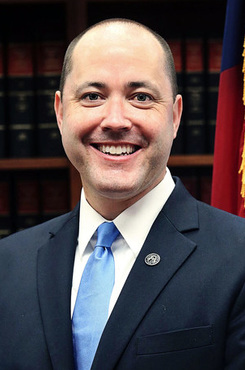AG Announces Settlement With Debt Collector
Attorney General Chris Carr says the settlement requires Midland to completely eliminate or reduce the judgment balances of approximately 5,136 Georgia consumers for a value of $8.73 million.
December 04, 2018 at 04:44 PM
5 minute read
 Georgia Attorney General Chris Carr (Courtesy photo)
Georgia Attorney General Chris Carr (Courtesy photo)Attorneys general from 41 states, including Georgia, and the District of Columbia announced Tuesday they have reached a settlement, including a $6 million cash payment, with Encore Capital Group Inc., one of the nation's largest debt buyers, and its subsidiaries Midland Credit Management Inc. and Midland Funding.
Georgia Attorney General Chris Carr said Tuesday the settlement requires Midland to eliminate or reduce the judgment balances of approximately 5,136 Georgia consumers, a reduction totaling $8.73 million. The affected cases are those in which Midland used an affidavit against the consumers in court between 2003 and 2009, Carr said. Midland is to notify impacted consumers by mail of the balance reduction and alert them that no further action is necessary from the consumer, Carr said.
Midland has agreed to pay $6 million to the states, of which Georgia's share is $177,781, according to Carr.
In addition, the settlement obligates Midland to set aside $25,000 per state to compensate consumers who may have paid Midland money that they didn't actually owe.
The deal requires restitution and reforms to the practice of “robosigning”—a term that originated with the mortgage foreclosure crisis, referring to the mass-processing of rubber-stamped or false debt documents.
“Robo-signing by Encore Capital Group Inc. and its subsidiaries was unjust and hurt consumers,” Georgia Attorney General Carr said in a news release Tuesday. “I am proud of our Consumer Protection Division's work throughout this process to protect the citizens of Georgia and hope this action sends a strong message to debt collectors that this behavior will not be tolerated.”
Encore Capital Group and Midland are based in San Diego. A corporate spokeswoman shared a statement from the company saying the “issues that were the genesis of the settlement have not been the company's practice for nearly 10 years.” The company also said the settlement will “cause no material impact to the business.”
Encore's most recent quarterly revenue statement showed $337 million in gross income and $21 million in profit. At that clip, the company would have annual revenue approaching $1.3 billion and profit near $88 million.
Encore said the funds for the settlement were fully reserved in 2015. The terms include a one-time cash payment of $6 million that will be divided among the states and $25,000 per state, available as relief for certain consumer claims. Also included are credits to the outstanding balance of certain judgments obtained against consumers between 2003 and 2009. Additionally, the agreement sets out operational requirements, nearly all of which are already part of current practice. Most of the requirements were implemented during or prior to Encore's negotiations with the attorneys general.
“Several years ago, we began discussions with various attorneys general, which ran in parallel to our discussions with the Consumer Financial Protection Bureau (CFPB) and covered similar topics. We settled with the CFPB in 2015 and are pleased to have reached today's agreement,” Ashish Masih, president and CEO of Encore, said in the company's release. “While we believe our practices were in accordance with relevant laws, we chose to agree to a settlement, so we can all move ahead.”
Masih said the new settlement and the CFPB agreement before it “actually strengthen our competitive position, as they've set the standard for the entire sector.” Masih added, “We are well positioned to continue our industry leadership in this regulatory environment.”
Debt-buying involves buying and selling overdue debts from creditors and other account owners at deep discounts, Carr noted. The debt buyers then seek to recover the full balance from consumers through collection attempts, by phone and mail and by litigation, if necessary. Debtors often lack counsel, and cases result in default judgments, affecting credit ratings and creating the possibility of wage garnishment, Carr said.
The settlement resolves the states' investigation into Midland's collection and litigation practices.
Carr's release encourages consumers who believe they are eligible for compensation under the settlement to complete and submit the claim form, downloadable from the Georgia Department of Law's Consumer Protection Division website at: www.consumer.ga.gov.
The settlement protects consumers from whom Midland is collecting, even if they aren't being sued, as the company must review original documents, if a consumer disputes a debt, and provide the documents free of charge. The company also agreed to properly train employees and the law firms with which it works.
The settlement includes: Alaska, Alabama, Arizona, Arkansas, Colorado, Connecticut, Delaware, the District of Columbia, Florida, Georgia, Hawaii , Idaho, Illinois, Indiana, Iowa, Kentucky, Louisiana, Maine, Michigan, Mississippi, Missouri, Montana, Nebraska, Nevada, New Hampshire, New Jersey, New Mexico, North Carolina, North Dakota, Ohio, Oklahoma, Oregon, Pennsylvania, Rhode Island, South Carolina, South Dakota, Tennessee, Utah, Vermont, Virginia, Washington, Wisconsin and Wyoming.
This content has been archived. It is available through our partners, LexisNexis® and Bloomberg Law.
To view this content, please continue to their sites.
Not a Lexis Subscriber?
Subscribe Now
Not a Bloomberg Law Subscriber?
Subscribe Now
NOT FOR REPRINT
© 2025 ALM Global, LLC, All Rights Reserved. Request academic re-use from www.copyright.com. All other uses, submit a request to [email protected]. For more information visit Asset & Logo Licensing.
You Might Like
View All
12-Partner Team 'Surprises' Atlanta Firm’s Leaders With Exit to Launch New Reed Smith Office
4 minute read
After Breakaway From FisherBroyles, Pierson Ferdinand Bills $75M in First Year
5 minute read
On the Move: Freeman Mathis & Gary Adds Florida Partners, Employment Pro Joins Jackson Lewis
6 minute readTrending Stories
- 1Settlement Allows Spouses of U.S. Citizens to Reopen Removal Proceedings
- 2CFPB Resolves Flurry of Enforcement Actions in Biden's Final Week
- 3Judge Orders SoCal Edison to Preserve Evidence Relating to Los Angeles Wildfires
- 4Legal Community Luminaries Honored at New York State Bar Association’s Annual Meeting
- 5The Week in Data Jan. 21: A Look at Legal Industry Trends by the Numbers
Who Got The Work
J. Brugh Lower of Gibbons has entered an appearance for industrial equipment supplier Devco Corporation in a pending trademark infringement lawsuit. The suit, accusing the defendant of selling knock-off Graco products, was filed Dec. 18 in New Jersey District Court by Rivkin Radler on behalf of Graco Inc. and Graco Minnesota. The case, assigned to U.S. District Judge Zahid N. Quraishi, is 3:24-cv-11294, Graco Inc. et al v. Devco Corporation.
Who Got The Work
Rebecca Maller-Stein and Kent A. Yalowitz of Arnold & Porter Kaye Scholer have entered their appearances for Hanaco Venture Capital and its executives, Lior Prosor and David Frankel, in a pending securities lawsuit. The action, filed on Dec. 24 in New York Southern District Court by Zell, Aron & Co. on behalf of Goldeneye Advisors, accuses the defendants of negligently and fraudulently managing the plaintiff's $1 million investment. The case, assigned to U.S. District Judge Vernon S. Broderick, is 1:24-cv-09918, Goldeneye Advisors, LLC v. Hanaco Venture Capital, Ltd. et al.
Who Got The Work
Attorneys from A&O Shearman has stepped in as defense counsel for Toronto-Dominion Bank and other defendants in a pending securities class action. The suit, filed Dec. 11 in New York Southern District Court by Bleichmar Fonti & Auld, accuses the defendants of concealing the bank's 'pervasive' deficiencies in regards to its compliance with the Bank Secrecy Act and the quality of its anti-money laundering controls. The case, assigned to U.S. District Judge Arun Subramanian, is 1:24-cv-09445, Gonzalez v. The Toronto-Dominion Bank et al.
Who Got The Work
Crown Castle International, a Pennsylvania company providing shared communications infrastructure, has turned to Luke D. Wolf of Gordon Rees Scully Mansukhani to fend off a pending breach-of-contract lawsuit. The court action, filed Nov. 25 in Michigan Eastern District Court by Hooper Hathaway PC on behalf of The Town Residences LLC, accuses Crown Castle of failing to transfer approximately $30,000 in utility payments from T-Mobile in breach of a roof-top lease and assignment agreement. The case, assigned to U.S. District Judge Susan K. Declercq, is 2:24-cv-13131, The Town Residences LLC v. T-Mobile US, Inc. et al.
Who Got The Work
Wilfred P. Coronato and Daniel M. Schwartz of McCarter & English have stepped in as defense counsel to Electrolux Home Products Inc. in a pending product liability lawsuit. The court action, filed Nov. 26 in New York Eastern District Court by Poulos Lopiccolo PC and Nagel Rice LLP on behalf of David Stern, alleges that the defendant's refrigerators’ drawers and shelving repeatedly break and fall apart within months after purchase. The case, assigned to U.S. District Judge Joan M. Azrack, is 2:24-cv-08204, Stern v. Electrolux Home Products, Inc.
Featured Firms
Law Offices of Gary Martin Hays & Associates, P.C.
(470) 294-1674
Law Offices of Mark E. Salomone
(857) 444-6468
Smith & Hassler
(713) 739-1250







